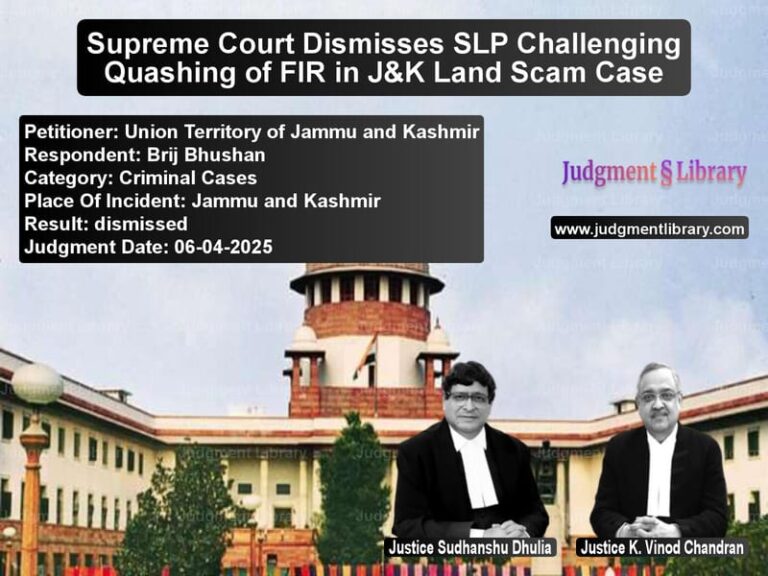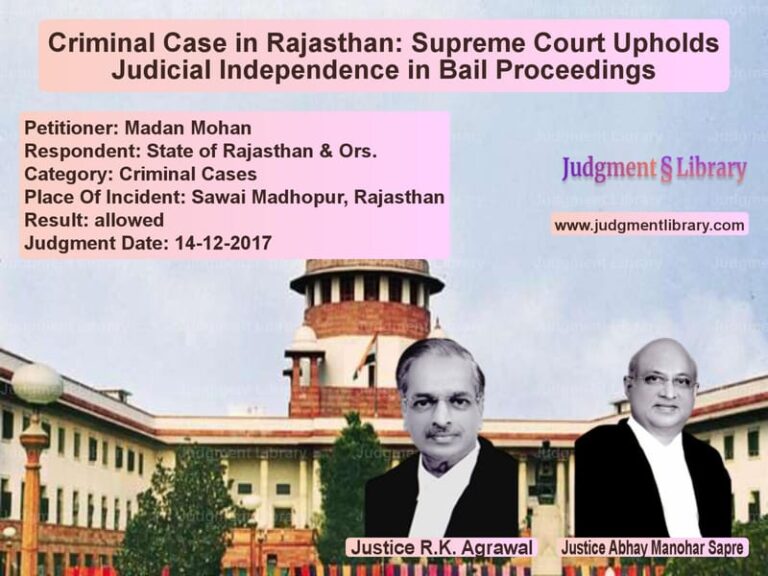Illegal Arms Possession: Supreme Court Acquits Two Accused for Lack of Evidence
The case of Mohmed Rafiq Abdul Rahim Shaikh vs. The State of Gujarat involved a serious charge under the Arms Act, 1959, where the accused were convicted for possession of prohibited ammunition and sentenced to seven years of rigorous imprisonment. The Supreme Court had to determine whether the convictions were legally justified based on the available evidence.
Background of the Case
The case began on February 4, 1993, when the police intercepted a Maruti Fronty car without a number plate at around 7 PM. The car was driven by one of the accused, Noormahammad Mahammadyasin Shaikh (A-1), who was found to be intoxicated. Upon searching the vehicle, the police recovered six live cartridges bearing the marking ‘L.V London,’ meant for a .45 revolver—a prohibited bore weapon.
Further investigation led to a raid at Bungalow 19, Satyam Society, where a large cache of weapons, including an AK-47 rifle, country-made revolvers, and ammunition, was discovered in the cellar. Based on the vehicle ownership and property records, the police charged two additional individuals:
- Accused No. 2 (A-2): Salim Shamsuddin Shaikh, the registered owner of the Maruti Fronty car.
- Accused No. 4 (A-4): Mohmed Rafiq Abdul Rahim Shaikh, listed as the occupier of Bungalow 19.
Trial Court’s Verdict
- The Trial Court convicted A-2 and A-4 under Sections 25(1)(a) and 25(1AA) read with Section 35 of the Arms Act, 1959.
- They were sentenced to three years of rigorous imprisonment under Section 25(1)(a) and seven years under Section 25(1AA), along with fines of Rs. 5,000 and Rs. 10,000, respectively.
- The sentences were ordered to run concurrently.
High Court’s Judgment
- The accused appealed the conviction before the Gujarat High Court.
- The High Court dismissed the appeal on September 11, 2007, upholding the Trial Court’s findings and sentencing.
- Following this, the accused approached the Supreme Court.
Arguments by the Petitioners (Accused A-2 and A-4)
- A-2 (Salim Shamsuddin Shaikh) argued that he had no direct involvement with the prohibited ammunition found in the car and was being convicted merely for being its registered owner.
- A-2 also pointed out that he was not inside the car when it was seized, nor was there any evidence linking him to the possession of the cartridges.
- A-4 (Mohmed Rafiq Abdul Rahim Shaikh) contended that he was in prison from December 15, 1992, to January 7, 1994, and had not been in the house when the arms and ammunition were recovered.
- He argued that the prosecution failed to establish any proof of his actual or constructive possession of the weapons found in the house.
Arguments by the Respondents (State of Gujarat)
- The prosecution maintained that A-2 was the owner of the car, making him responsible for its contents.
- The State argued that A-4’s name appeared in the municipal records as the occupier of the house where the weapons were found, thereby establishing his constructive possession.
- The prosecution also relied on statements from other accused linking A-4 to the weapons.
Supreme Court’s Observations
The Supreme Court carefully examined the evidence and past legal precedents. The key observations included:
- No direct possession was established: The Court held that mere ownership of a car or listing as an occupier in municipal records does not constitute possession of illegal arms.
- Constructive possession requires proof of knowledge: The Court emphasized that to convict under the Arms Act, the prosecution must establish that the accused had knowledge of and control over the weapons.
- Gunwantlal vs. The State of Madhya Pradesh (1972) was cited: This case held that possession under the Arms Act must be conscious, meaning the accused must be aware of the presence of weapons.
- No evidence linking A-2 to the cartridges: The Court found that the cartridges were discovered in a car being driven by A-1, and there was no proof that A-2 had any knowledge of them.
- A-4 was in jail at the time of the raid: The Court noted that A-4 was imprisoned for nearly three months before the raid, making it impossible for him to have controlled the storage of weapons.
Key Judgment Excerpts
The Supreme Court ruled:
“We have no hesitation in saying that the conviction of this Accused under Section 25 (1AA) is wholly unwarranted since he was not in possession of the prohibited ammunition at all, much less for the purpose of sale which is a requirement for attracting the provision of Section 25 (1AA).”
Regarding A-4’s conviction, the Court observed:
“A-4 was certainly not found in actual possession of the weapons or even the house in which the weapons and ammunition were found. To bring home a charge it was obviously necessary for the prosecution to establish intention and consciousness of the A-4 of the firearms and ammunition found in A-4’s house. This was not done.”
Final Judgment
- The Supreme Court set aside the convictions of both A-2 and A-4.
- It ruled that there was no evidence to prove possession or control of the illegal weapons and ammunition.
- The appeals were allowed, and both accused were acquitted of all charges.
Conclusion
This judgment highlights the importance of proving conscious possession in cases under the Arms Act. The Supreme Court reinforced that mere ownership of a vehicle or listing as an occupier of a property does not establish possession unless accompanied by evidence of knowledge and control. The ruling serves as an important precedent in cases involving constructive possession of illegal weapons.
Petitioner Name: Mohmed Rafiq Abdul Rahim Shaikh.Respondent Name: The State of Gujarat.Judgment By: Justice S.A. Bobde, Justice L. Nageswara Rao.Place Of Incident: Ahmedabad, Gujarat.Judgment Date: 13-09-2018.
Don’t miss out on the full details! Download the complete judgment in PDF format below and gain valuable insights instantly!
Download Judgment: Mohmed Rafiq Abdul R vs The State of Gujarat Supreme Court of India Judgment Dated 13-09-2018.pdf
Direct Downlaod Judgment: Direct downlaod this Judgment
See all petitions in Attempt to Murder Cases
See all petitions in Fraud and Forgery
See all petitions in Terrorist Activities
See all petitions in Judgment by S. A. Bobde
See all petitions in Judgment by L. Nageswara Rao
See all petitions in allowed
See all petitions in Quashed
See all petitions in supreme court of India judgments September 2018
See all petitions in 2018 judgments
See all posts in Criminal Cases Category
See all allowed petitions in Criminal Cases Category
See all Dismissed petitions in Criminal Cases Category
See all partially allowed petitions in Criminal Cases Category







